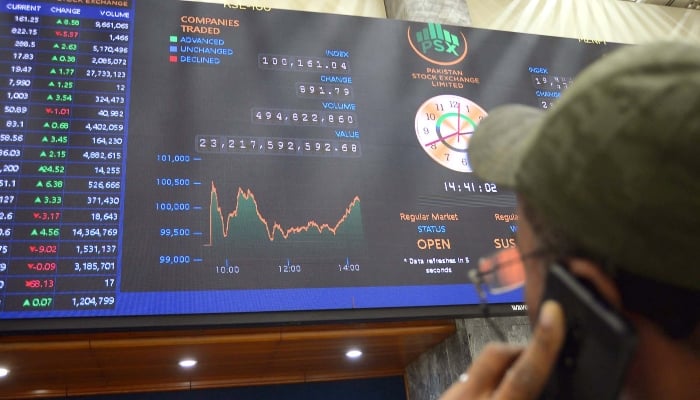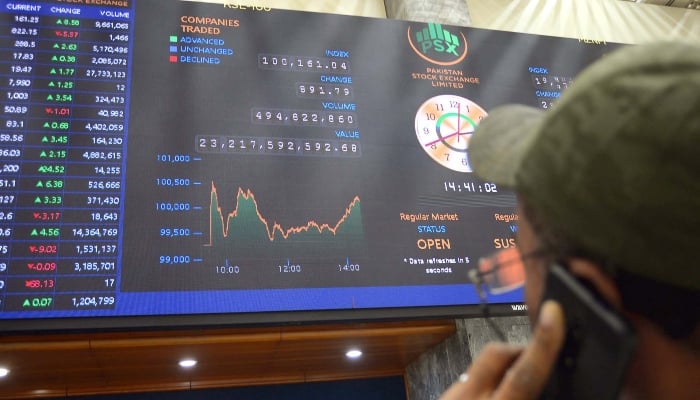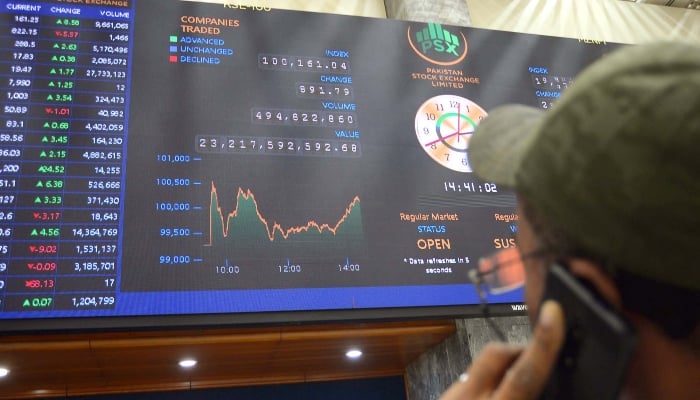PSX extends losses amid profit-taking and tax reform concerns
KSE-100 Index falls 2,671.87 points, or -2.41%, to intraday low of 108,398.42

The capital market remained under selling pressure on Thursday, continuing its decline from the previous day as aggressive profit-taking and concerns over proposed tax reforms dampened investor sentiment.
The Pakistan Stock Exchange’s (PSX) benchmark KSE-100 Index dropped 2,671.87 points, or -2.41%, to a low of 108,398.42 during early trading, extending losses from Wednesday’s historic single-day fall of 3,790 points, the largest point-wise decline in PSX history. The index closed Wednesday at 111,070.29 after a session marked by a sharp reversal from early gains.
Investor concerns were heightened by the introduction of The Tax Laws (Amendment) Bill, 2024, which proposes stringent measures targeting non-filers to broaden the tax base. Key provisions include barring non-filers from purchasing vehicles above 800cc, property, and shares beyond certain limits.
The proposed legislation also restricts non-filers from opening bank accounts or making large financial transactions, while empowering the Federal Board of Revenue (FBR) to freeze bank accounts, seal properties, and block property transfers of non-compliant individuals. These measures sparked fears of reduced consumer spending and liquidity in the banking sector, adding to the bearish tone in the market.
Despite the recent downturn in equities, Pakistan’s macroeconomic fundamentals continue to improve, providing a positive backdrop for long-term investor confidence.
The current account posted a $729 million surplus in November, the largest monthly figure in nearly a decade and the highest since February 2015. For the first five months of FY2025, the current account surplus stood at $944 million, compared to a deficit of $1.67 billion during the same period last year.
This turnaround was driven by a reduction in the trade deficit, a decline in the services deficit, and decreased interest and dividend repatriations.
Foreign direct investment (FDI) also showed growth, increasing by 31% year-on-year to $1.124 billion during the first five months of FY2025.
Meanwhile, remittances grew by 29% year-on-year in November, reaching $2.9 billion, bringing the total for the first five months of FY2025 to $14.8 billion. This growth was supported by government incentives promoting formal banking channels and stable foreign reserves, which now stand at $16.6 billion.
The State Bank of Pakistan (SBP) recently reduced the policy rate by 200 basis points, lowering it to 13%. This marked the fifth consecutive rate cut as inflation dropped to 4.9% in November, the lowest since April 2018.
While acknowledging that inflation could see a temporary uptick in the coming months due to base effects, SBP Governor Jameel Ahmed expressed confidence in achieving the medium-term inflation target of 5-7% by June 2025.
The equity market remains in a correction phase, with profit-taking dominating activity as investors reassess valuations and adjust to evolving fiscal and monetary policies.
While the improving economic fundamentals provide a positive outlook for long-term growth, the near term is expected to remain volatile as participants weigh the implications of the proposed tax measures and ongoing macroeconomic developments.







